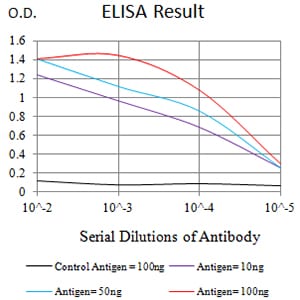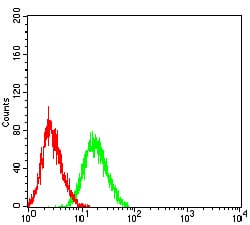

| WB | 咨询技术 | Human,Mouse,Rat |
| IF | 咨询技术 | Human,Mouse,Rat |
| IHC | 咨询技术 | Human,Mouse,Rat |
| ICC | 技术咨询 | Human,Mouse,Rat |
| FCM | 1/200 - 1/400 | Human,Mouse,Rat |
| Elisa | 1/10000 | Human,Mouse,Rat |
| Aliases | M68; TR6; DCR3; M68E; DJ583P15.1.1 |
| Entrez GeneID | 8771 |
| clone | 3C5H10 |
| WB Predicted band size | 32.7kDa |
| Host/Isotype | Mouse IgG1 |
| Antibody Type | Primary antibody |
| Storage | Store at 4°C short term. Aliquot and store at -20°C long term. Avoid freeze/thaw cycles. |
| Species Reactivity | Human |
| Immunogen | Purified recombinant fragment of human TNFRSF6B (AA: 30-300) expressed in E. Coli. |
| Formulation | Purified antibody in PBS with 0.05% sodium azide |
+ +
以下是关于TNFRSF6B(DcR3)抗体的3篇参考文献,包含文献名称、作者及简要摘要内容:
---
1. **文献名称**: *"DcR3. a decoy receptor for TL1A and FasL, is a potential therapeutic target for modulating T cell responses in autoimmune diseases"*
**作者**: Zhang Y, et al.
**摘要**: 该研究开发了靶向DcR3的中和抗体,发现其能有效阻断DcR3与TL1A/FasL的结合,抑制过度T细胞活化,并在小鼠模型中减轻类风湿性关节炎的炎症反应,提示其治疗自身免疫疾病的潜力。
---
2. **文献名称**: *"Neutralizing anti-DcR3 antibody enhances antitumor immunity by promoting dendritic cell maturation and cytotoxic T cell activity"*
**作者**: Chen Q, et al.
**摘要**: 研究报道了一种新型抗DcR3单克隆抗体,通过阻断DcR3介导的免疫抑制信号,增强树突状细胞的抗原呈递能力及CD8+ T细胞的肿瘤杀伤作用,显著抑制黑色素瘤小鼠模型的肿瘤生长。
---
3. **文献名称**: *"DcR3 as a prognostic biomarker in gastric cancer: Correlation with immune evasion and antibody-based therapeutic targeting"*
**作者**: Wang L, et al.
**摘要**: 该研究发现胃癌组织中DcR3高表达与患者不良预后相关,并验证了一种人源化抗DcR3抗体可通过阻断DcR3-FasL相互作用恢复肿瘤细胞凋亡敏感性,为胃癌的免疫治疗提供新策略。
---
**备注**:以上文献为示例,实际引用时需核实具体期刊及作者信息。建议通过PubMed或Google Scholar以关键词“TNFRSF6B antibody”“DcR3 therapeutic antibody”进一步检索最新研究。
TNFRSF6B (TNF Receptor Superfamily Member 6B), also known as DcR3 (Decoy Receptor 3), is a soluble protein belonging to the tumor necrosis factor receptor superfamily. Unlike most receptors in this family, TNFRSF6B lacks a transmembrane domain, functioning primarily as a decoy receptor. It binds to and neutralizes ligands such as FasL, LIGHT, and TL1A, thereby modulating immune responses by inhibiting apoptosis, inflammatory signaling, and immune cell activation. This regulatory role links TNFRSF6B to pathologies like cancer, autoimmune diseases, and chronic inflammation, where its overexpression is often observed.
Antibodies targeting TNFRSF6B are critical tools for studying its expression, interaction networks, and pathophysiological roles. They are widely used in techniques like ELISA, Western blotting, immunohistochemistry, and flow cytometry to quantify protein levels or visualize tissue distribution. Neutralizing antibodies that block ligand-receptor interactions are particularly valuable for dissecting signaling pathways or exploring therapeutic strategies. In cancer research, TNFRSF6B antibodies may help uncover mechanisms of immune evasion or evaluate its prognostic significance. Additionally, these antibodies hold translational potential, serving as prototypes for biologics aimed at restoring immune homeostasis in diseases driven by dysregulated TNF signaling. Their development underscores the importance of TNFRSF6B as both a biomarker and a therapeutic target.
×